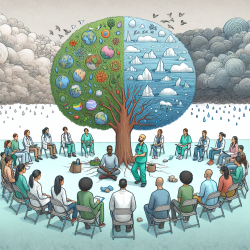The impacts of global climate change are not only physical but also profoundly psychological. As practitioners in the field of mental health, it is crucial to understand and address the mental health challenges that arise due to climate-related events. The narrative review titled "Strategies for Delivering Mental Health Services in Response to Global Climate Change" provides valuable insights into how mental health services can be adapted and improved to meet these challenges.
Understanding the Mental Health Impacts of Climate Change
Climate change contributes to a variety of mental health issues, including anxiety, depression, post-traumatic stress disorder (PTSD), and substance abuse. These issues arise from acute events like hurricanes and wildfires, sub-acute events such as prolonged droughts, and long-term changes like rising sea levels. Practitioners must be prepared to address these diverse impacts through tailored interventions.
Strategies for Acute Events
In the aftermath of acute events, such as hurricanes or floods, mental health services must focus on immediate response and resilience building. Key strategies include:
- Preparedness Planning: Develop programs for monitoring and treating mental health issues and strengthen community resilience.
- Training Community Health Workers: Equip non-specialists with skills to deliver basic mental health support.
- Resource Assessment: Conduct inventories of available resources and identify at-risk populations.
Tackling Sub-Acute Changes
The mental health impacts of sub-acute changes like droughts require a different approach. Strategies include:
- Advocacy for Mitigation Policies: Support policies that reduce the impact of climate change on communities.
- Adaptation of Interventions: Modify existing guidelines to address secondary impacts such as economic threats and displacement.
Addressing Long-Term Changes
The prospect of long-term environmental changes necessitates ongoing mental health support strategies:
- Risk Communication Interventions: Implement evidence-based communication strategies to manage stress and anxiety related to climate change threats.
- Mental Health Benefits of Conservation: Promote environmental conservation as a means to improve mental well-being.
- Cultivating Resilience: Encourage psychological growth through community engagement in climate action.
The Role of Practitioners
Mental health practitioners play a crucial role in implementing these strategies. By staying informed through continuous education and research, practitioners can enhance their skills and adapt their practices to better serve communities affected by climate change. Networking with other professionals and participating in relevant training sessions can further bolster their capacity to respond effectively.
The Importance of Further Research
The narrative review underscores the need for ongoing research into the effectiveness of various interventions across different settings and populations. Practitioners are encouraged to contribute to this body of knowledge by documenting their experiences and outcomes in delivering mental health services amidst climate-related challenges.
This comprehensive approach not only enhances individual practitioner skills but also strengthens the overall capacity of mental health services to respond to the multifaceted impacts of global climate change.










